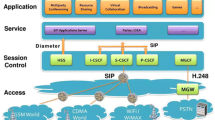Abstract
IP Mulimedia Subsystem (IMS) is an architecture that can provide innovative solutions for multimedia services deployment regardless the type and network topology. New delivered value added services require significant changes to the multi-services IP network design, including the activation of multiple functions such as quality of service (QoS) capabilities, security mechanisms, multicast routing, etc. To ensure that services delivery meets the high expectations of end users, factors affecting QoS or user’s quality of experience (QoE) must be properly considered. This paper will give a study of a the ’SIP Call Setup Delay’ metric which will serve us to accomplish the QoE measurement in the case of VoIP sessions carried over IPv4 and IPv6 IMS networks.
Access this chapter
Tax calculation will be finalised at checkout
Purchases are for personal use only
Preview
Unable to display preview. Download preview PDF.
Similar content being viewed by others
References
(Ken) Salchow Jr., K.J.: Introduction to the IP Multimedia Subsystem (IMS): IMS Basic Concepts and Terminology (2007)
Human Factors (HF); Quality of Experience (QoE) Requirements for Real-time Communication Services, ETSI TR 102 643 (November 2009)
Assuring QoE on Next Generation Networks, White Paper by Empirix (2003)
Batteram, H., Damm, G., Mukhopadhyay, A., Philippart, L., Odysseos, R., Urrutia-Valds, C.: Delivering Quality of Experience in Multimedia Networks. Bell Labs Technical Journal, 175–193 (2009)
ITU-T TR Q-series supplements 51 signaling requirements for IP-QoS (December 2004)
Author information
Authors and Affiliations
Editor information
Editors and Affiliations
Rights and permissions
Copyright information
© 2013 Springer-Verlag Berlin Heidelberg
About this paper
Cite this paper
El Mahdi Boumezzough, M., Idboufker, N., Ait Ouahman, A. (2013). Evaluation of SIP Call Setup Delay for VoIP in IMS. In: Guyot, V. (eds) Advanced Infocomm Technology. ICAIT 2012. Lecture Notes in Computer Science, vol 7593. Springer, Berlin, Heidelberg. https://doi.org/10.1007/978-3-642-38227-7_6
Download citation
DOI: https://doi.org/10.1007/978-3-642-38227-7_6
Publisher Name: Springer, Berlin, Heidelberg
Print ISBN: 978-3-642-38226-0
Online ISBN: 978-3-642-38227-7
eBook Packages: Computer ScienceComputer Science (R0)




